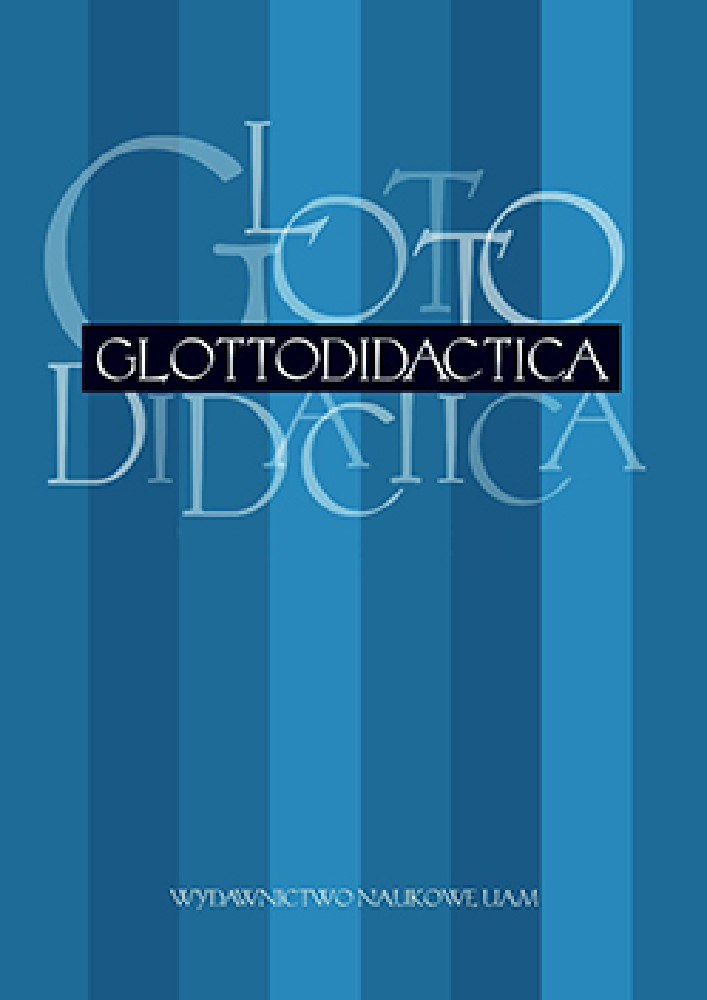Abstract
The aim of the following article is to present the results of the translation of smell lexemes used in the Novel Parfume: The Story of a Murderer by Patrick Süskind and their Polish equivalents in Pachnidło. Historia pewnego mordercy by Małgorzata Łukasiewicz. The article discusses semantic, lexical and syntactical problems, influence of the context on the translation and the results of the analysis.References
Bußmann, H., 2002. Lexikon der Sprachwissenschaft. Stuttgart: Alfred Kröner Verlag.
Doroszewski, W., 1996. Słownik języka polskiego. Warszawa: Wydawnictwo Naukowe PWN (=SJP).
Kittel, H., Frank, A.,P., Greiner, N., Hermans, T., Koller, W., Lambert, J., Paul, F., 2004. Übersetzung, Translation, Traduction. Berlin: Walter de Gruyter.
Kunkel-Razum, K., Scholze-Stubenrecht, W., Wermke, M., 2007. Deutsches Universalwörterbuch 6. Auflage. Mannheim–Leipzig–Wien–Erich: Dudenverlag (=DUW).
Nord, Ch., 1993. Einführung in das funktionale Übersetzen. Tübingen-Basel: A. Francke
Piprek, J., Ippoldt, J., 2001. Wielki słownik niemiecko-polski. Warszawa: Wiedza Powszechna PW (=WSNP).
Salnikov, N., 1995. Sprachtransfer – Kulturtransfer. Frankfurt am Main: Peter Lang GmbH.
Siever, H., 2010. Übersetzen und Interpretation. Frankfurt am Main: Peter Lang GmbH.
Snell-Hornby, M., Hönig, H.,G., Kußmaul, P., Schmitt, P.A., 2006. Handbuch Translation. Tübingen: Stauffenburg Verlag Brigitte Narr GmbH.
Staniewski, P., 2010. Schwierigkeiten bei der Übersetzung der Geruchsbezeichnungen am
Beispiel des Romans Das Parfum von Patrick Süskind. In: Małgorzewicz, A. (Hrsg.). Translation: Teorie-Praxis-Didaktik. Dresden–Wrocław: Neisse Verlag, ATUT, 259–267.
Stolze, R., 1985. Grundlagen der Textübersetzung. Heidelberg: Julius Gross Verlag.
Süskind, P., 1990. Pachnidło. Historia pewnego mordercy. Aus dem Deutschen von Małgorzata Łukasiewicz. Warszawa: Świat książki (=Pach).
Süskind, P., 1994. Das Parfum. Die Geschichte eines Mörders. Zürich: Digenes Verlag AG (=Par).
License
Authors
Authors of texts accepted for publication in Glottodidactica are required to complete, sign and return to the Editorial team’s office the Agreement for granting a royalty-free license to works with a commitment to grant a CC sub-license.
Under the agreement, the authors of the texts published in Glottodidactica grant Adam Mickiewicz University in Poznań a non-exclusive, royalty-free license and authorize the use of Attribution-NoDerivatives 4.0 International (CC BY-ND 4.0) Creative Commons sub-license.
The authors retain the right to the free disposal of the work.
Users
Interested Internet users are entitled to use works that have been published in Glottodidactica since 2016, under the following conditions:
▪ attribution – obligation to provide, together with the distributed work, information about the authorship, title, source (link to the original work, DOI) and the license itself.
▪ no derivatives – the work must be preserved in its original form. Without the author's consent, it is not possible to distribute the modified work in the form of translations, publications, etc.
Copyrights are reserved for all texts published before 2016.
Miscellaneous
Adam Mickiewicz University in Poznań retains the property right as a whole (layout, graphic form, title, cover design, logo etc.).
Privacy statement
The names and email addresses published on this journal site will be used exclusively for the purposes declared by this journal and cannot be used for any other purpose or by any other party.




